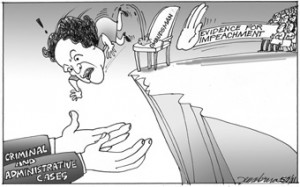THE DECISION of impeached Ombudsman Merceditas Gutierrez to resign from office by the end of this week came as a surprise, but it was not altogether unexpected. That is to say, the option of resignation had remained viable despite her spirited protestations. She was never more eloquent than when she rose to defend herself, and claimed she was ready to prove her innocence at the impeachment trial in the Senate. And yet there were early signs that her office, one of the most powerful in the entire government, could be vulnerable to pressure.
Mark Jalandoni, the deputy ombudsman perceived closest to Gutierrez, suddenly resigned, after complaints against him were filed; another deputy ombudsman, Emilio Gonzalez III, was sacked by Malacañang for his role in helping cause the hostage-taking incident last August that led to the death of eight Hong Kong tourists; unsettling news that former members of the governing coalition in the presidency of Gloria Arroyo had joined the House prosecution panel became talk of the town. Even Arroyo’s midnight visit to Gutierrez’s house, on the same night the House impeached her, only served to confirm the ombudsman’s perceived closeness to the former president.
The chief sign of vulnerability, however, was the overwhelming impeachment vote in the House of Representatives. In a moment of candor, a close Arroyo ally said they expected the vote for impeachment to go against Gutierrez, but by a much smaller margin. In other words, the Gutierrez supporters were completely routed.
Since impeachment is a quasi-political process, the overwhelming vote must have reset not a few political calculations. Coupled with President Benigno Aquino III’s decision to wage a high-profile campaign to generate public support for the impeachment, as the vital next step to remove the main obstacle to his anti-corruption initiatives, the impeachment vote must have made Gutierrez feel especially vulnerable to mounting political pressure.
But the “quasi” part played its part too. Contrary to the sometimes shrill insinuations raised by Arroyo’s allies in the House, the impeachment process was not a mere act of vengeance, but a deliberate, well-thought-out, participative exercise in accountability. While the evidence for the six articles of impeachment varied in quality, each article was fairly and fully vetted in the House. And the impeachment vote did not stop the House leadership from working to further strengthen their cases, to the extent of entering into negotiations with former officials of the Office of the Ombudsman. Also, the possibility that former senator Ramon Magsaysay Jr. would testify on the issue of the fertilizer fund scam, and the threat of former fugitive Sen. Panfilo Lacson to search for more incriminating evidence in his “baul,” would have had a positive effect on the senator-judges, and must have been another source of concern for Gutierrez.
In other words, the legal aspect of the impeachment was as solid as Gutierrez may have had reason to fear, and the public had the right to expect.
Nevertheless, despite these signs of vulnerability (some made clearer in the glare of hindsight), the news of Gutierrez’s resignation still came as a surprise. Apparently, the deciding factor, at least in the last couple of days before she finally made up her mind, was the assurance she received from Malacañang that the impeachment was “not personal.”
Much can be made of the nature of this assurance (it strikes us as very Filipino, this exchange that revolves around the pledge that there was no rancor, no personal hostility, involved), but nothing Gutierrez said in her post-resignation press conference, and nothing President Aquino said in his, could be construed to equate assurance with insurance.
Malacañang did not promise to restrain any interested party from filing criminal and administrative charges against Gutierrez in exchange for her resignation, and in fact the political reality is it could not have made any such promise. But Albay Rep. Edcel Lagman, who offered the more cogent arguments in support of Gutierrez during the impeachment debates in the House, was quick to suspect a quid pro quo. Considering the antecedents, we think that is highly unlikely. But we will find out for certain, when the first cases begin to pile up against private citizen Merceditas Gutierrez.


